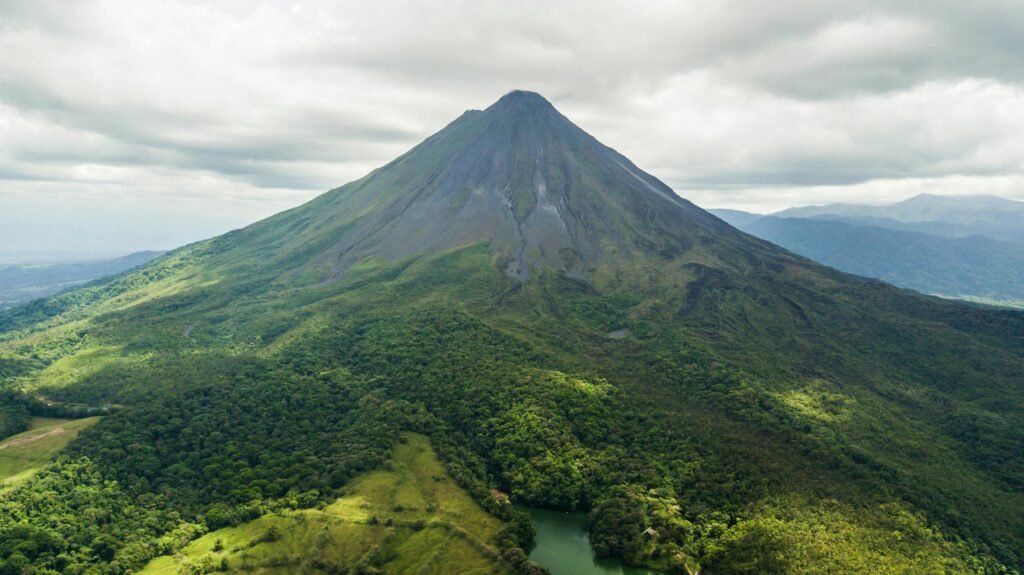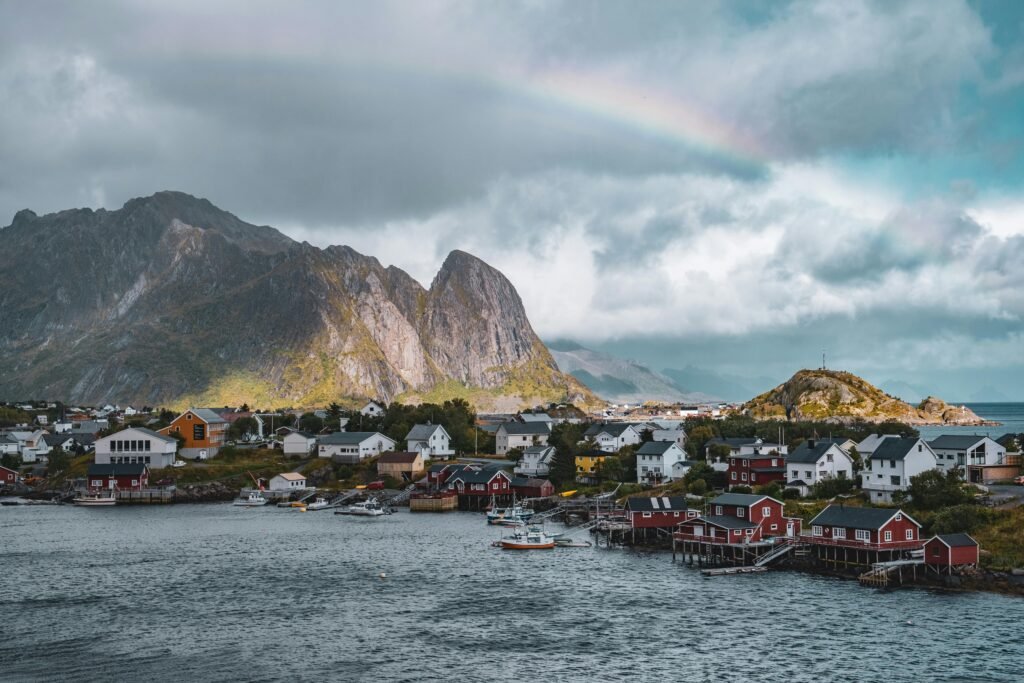Introduction to Eco-Friendly Travel
Eco-friendly travel, often referred to as sustainable tourism, encompasses travel choices that prioritize environmental conservation and cultural integrity. In an era marked by climate change and ecological degradation, the significance of eco-friendly travel has never been more pronounced. The urgency to transition towards environmentally responsible tourism practices is imperative, as the natural landscapes we admire and the local communities we engage with face unprecedented challenges.
Responsible travelers can make a meaningful impact on the planet by choosing destinations that are committed to sustainability. This form of travel not only reduces the carbon footprint associated with tourism but also fosters a deeper connection to nature and local cultures. Eco-friendly destinations often emphasize conserving natural resources, protecting wildlife, and promoting policies that benefit the environment and local populations. By visiting these locations, travelers can support initiatives that prioritize conservation and community engagement, reflecting a growing awareness of the need for sustainable living.
Furthermore, such travel choices can play a critical role in protecting fragile ecosystems. For instance, when eco-conscious travelers opt for nature reserves or protected areas, they contribute to the funding and awareness needed for ongoing conservation efforts. Additionally, engaging in responsible tourism practices, such as minimizing waste, respecting wildlife, and embracing local cultures, enhances the overall travel experience by fostering a sense of appreciation and respect for the natural world.
In an age where consumer choices significantly influence environmental well-being, embracing eco-friendly travel emerges as a vital responsibility for nature lovers and global citizens alike. By making informed decisions about where and how they travel, individuals can contribute to the preservation of the planet while enjoying its diverse beauty.
Criteria for Choosing Eco-Friendly Destinations
When selecting eco-friendly destinations for nature lovers and responsible travelers, various criteria are employed to ensure that these places genuinely embody sustainability and environmental consciousness. One of the primary factors is the commitment to sustainable practices, which encompasses the implementation of eco-friendly policies by local authorities and businesses. This includes the use of renewable energy sources, waste management initiatives, and water conservation strategies, which collectively contribute to reducing the environmental impact of tourism.
Another essential criterion is conservation efforts. Destinations recognized for their conservation programs must actively work on protecting and preserving local ecosystems, wildlife habitats, and biodiversity. This can manifest through various initiatives, such as the establishment of protected areas, wildlife reserves, and programs aimed at rehabilitating endangered species. Tourists who choose these destinations can partake in activities that promote education about local flora and fauna, thereby fostering a greater appreciation for natural environments.
Community involvement is equally vital in evaluating eco-friendly destinations. Responsible travelers seek locations where local communities are engaged in tourism and benefit from its economic returns. This can include encouraging local businesses, promoting cultural heritage, and ensuring that the voices of indigenous populations are heard in decision-making processes. Such engagement ensures that travel promotes social equity and cultural respect.
Accessibility to natural environments is another critical aspect. Ideal eco-friendly destinations should provide opportunities for visitors to experience pristine landscapes, whether through hiking trails, guided nature walks, or wildlife observation. Prioritizing destinations that offer immersive experiences allows travelers to connect with nature while fostering a deeper understanding of the importance of conservation.
Costa Rica: A Biodiversity Hotspot
Costa Rica is widely recognized as one of the most biodiverse countries in the world, boasting an extraordinary variety of flora and fauna within its relatively small territory. Covering just 0.03% of the planet’s surface, Costa Rica is home to over 5% of the world’s species, making it an essential destination for nature lovers and responsible travelers. The country’s commitment to environmental conservation is evident in its extensive network of national parks and wildlife reserves, which protect these rich ecosystems and promote sustainable tourism.
The national parks in Costa Rica, such as Corcovado National Park and Manuel Antonio National Park, provide an opportunity for outdoor enthusiasts to immerse themselves in nature. These parks offer a multitude of activities, including hiking through lush rainforests, spotting unique wildlife such as sloths, toucans, and howler monkeys, and enjoying breathtaking coastal views. Bird-watching is particularly popular, with Costa Rica being home to over 900 bird species, making it a paradise for avian enthusiasts.
In addition to its stunning national parks, Costa Rica emphasizes eco-lodges and environmentally friendly accommodations that allow visitors to experience nature while minimizing their environmental impact. These lodges often utilize sustainable practices such as solar energy, rainwater harvesting, and organic farming, which contribute to the preservation of the surrounding ecosystems. Participating in locally guided eco-tours enables tourists to learn more about the diverse habitats and the importance of conservation efforts in the region.
Costa Rica not only attracts visitors with its natural beauty but also sets a benchmark for sustainable travel, embodying the spirit of responsible tourism. By choosing to explore Costa Rica, travelers can enjoy adventure and discovery while supporting initiatives aimed at preserving the environment and its remarkable biodiversity.

New Zealand: A Nature Lover’s Paradise
New Zealand is renowned for its breathtaking landscapes, ranging from rugged mountains to serene beaches, making it a top destination for nature lovers and responsible travelers alike. With its commitment to sustainability and eco-friendly practices, New Zealand has become a model for preserving natural beauty while accommodating the needs of visitors. The country’s diverse ecosystems provide a unique opportunity for travelers to explore pristine environments while promoting conservation efforts.
One of the most significant natural treasures in New Zealand is Fiordland National Park, which is a UNESCO World Heritage site. The park is home to stunning fjords, including the famous Milford Sound and Doubtful Sound, where visitors can engage in eco-friendly activities such as kayaking, hiking, and wildlife observations. These experiences allow travelers to immerse themselves in the breathtaking scenery while minimizing their environmental impact. Furthermore, the region encourages sustainable tourism practices, ensuring that the natural environment is preserved for future generations.
In addition to the remarkable Fiordland, New Zealand offers a network of Great Walks that showcases the country’s incredible landscapes. These multi-day hiking trails traverse various terrains, from lush rainforests to alpine regions. Travelers can choose from walks such as the Tongariro Alpine Crossing or the Routeburn Track, which provide breathtaking views and opportunities for wildlife encounters. By participating in these guided walks, visitors can support local economies and learn about the importance of conservation along the way.
Responsible travel initiatives in New Zealand allow tourists to engage in conservation-based experiences, such as tree planting or habitat restoration projects. These programs not only enrich the travelers’ experiences but also contribute significantly to the preservation of New Zealand’s diverse ecosystems. In embracing eco-friendly practices, New Zealand exemplifies how travelers can effectively enjoy the beauty of nature while taking care to protect it.

Sweden: Sustainable Practices in Nature
Sweden has emerged as a leader in eco-friendly tourism, showcasing a commitment to sustainability that resonates deeply with nature enthusiasts and responsible travelers alike. This Nordic gem prioritizes preserving its stunning landscapes while offering visitors meaningful experiences. Regions such as Sápmi and the Swedish Lapland exemplify Sweden’s dedication to sustainable practices. The cultural significance of Sápmi, rooted in Sami traditions, offers travelers insights into indigenous lifestyles that harmonize with nature. Visitors to this region can partake in guided tours that promote eco-consciousness while exploring the breathtaking terrain that characterizes the Arctic wilderness.
In the Swedish Lapland, activities such as hiking and camping are conducted with a focus on minimizing environmental impacts. The area is rich with trails that wind through majestic mountains, forests, and rivers, making it an ideal destination for those seeking adventure without compromising nature’s integrity. Experienced guides emphasize sustainable trekking practices, encouraging hikers to follow ‘Leave No Trace’ principles to preserve the region’s pristine environment. An increasing number of eco-lodges in the region further enhance the travel experience, offering accommodations designed to minimize energy consumption and integrate seamlessly with the natural surroundings.
One of the standout experiences in the Swedish Lapland is the opportunity to camp under the mesmerizing display of the Northern Lights. Local operators practice sustainability by using eco-friendly camping equipment and setting up camps in designated areas, thereby ensuring minimal disruption to the delicate ecosystem. Additionally, many of these operators incorporate educational components into their tours, encouraging travelers to engage with and appreciate Sweden’s unique flora and fauna.
Through its initiatives, Sweden not only showcases its breathtaking natural beauty but also serves as a model for responsible tourism. By combining adventure with sustainability, the country invites nature lovers to experience its wonders while playing an active role in their preservation.

The Galápagos Islands: Nature’s Unique Laboratory
The Galápagos Islands, an archipelago located in the Pacific Ocean, are renowned for their exceptional biodiversity and unique ecosystems. This collection of islands is often referred to as “Nature’s Laboratory” due to the vital role it has played in the study of evolution and ecology. The distinct flora and fauna found here, including iconic species such as the Galápagos tortoise, marine iguana, and blue-footed booby, thrive in various habitats that range from arid deserts to lush highlands. This remarkable biological diversity is a product of the islands’ isolation, as well as the unique geological processes that formed them.
Conservation efforts in the Galápagos Islands are critical to preserving this delicate ecosystem. Since the islands are classified as a UNESCO World Heritage site, a number of policies and initiatives have been established to protect both the local wildlife and their habitats. The Galápagos National Park, established in 1959, covers about 97% of the land area of the islands and plays a crucial role in safeguarding the environment from invasive species, pollution, and other human-related threats. By prioritizing conservation, local authorities work to maintain the islands’ ecological integrity while allowing visitors to appreciate their natural wonders.
For responsible travelers, the Galápagos Islands offer various eco-tour options that promote sustainable tourism. Visitors can engage in guided tours, snorkeling trips, and wildlife watching experiences that adhere to strict environmental guidelines. These activities not only provide an unforgettable experience but also contribute to the conservation efforts by supporting local communities and educating travelers about the importance of protecting this unique biosphere. Choosing eco-tours ensures that the natural beauty of the Galápagos is preserved for future generations while allowing nature lovers to enjoy its splendor responsibly.

Patagonia: Untamed Wilderness
Patagonia, nestled in the southern region of Chile and Argentina, is renowned for its stunning and diverse landscapes, making it a perfect eco-friendly destination for nature lovers and responsible travelers. This vast area, known for its dramatic mountains, vast glaciers, and pristine lakes, is a haven for outdoor enthusiasts seeking to connect with nature while minimizing their environmental impact. Among the highlights of Patagonia are the famous national parks, such as Torres del Paine, which boasts breathtaking views and extensive trekking opportunities.
Torres del Paine National Park is one of the most visited and celebrated parks in Patagonia. It offers numerous trails, ranging from dazzling day hikes to multi-day trekking circuits. The famous “W” and “O” circuits attract thousands of hikers each year, providing them with unforgettable views of granite peaks, azure lakes, and rich biodiversity. The park is also home to a variety of wildlife, including guanacos, Andean condors, and elusive pumas, presenting excellent opportunities for responsible wildlife spotting.
In addition to its outdoor activities, Patagonia promotes sustainability through numerous eco-friendly lodges and accommodations. These establishments emphasize the importance of conservation and often utilize renewable energy sources, waste management systems, and locally sourced materials. Many lodges collaborate with local communities to support conservation initiatives while ensuring that visitors have a sustainable and enriching experience.
Travelers to Patagonia can engage in various environmentally conscious experiences, such as guided tours run by local experts, which further promote the preservation of the region’s natural beauty. Kayaking through glacial fjords, birdwatching in national parks, and horseback riding along scenic routes provide unique and unforgettable ways to explore the untamed wilderness while adhering to responsible travel principles.

Iceland: Nature Meets Sustainability
Iceland is often hailed as a beacon of sustainability, merging its stunning natural landscapes with a profound commitment to renewable energy. This Nordic island nation boasts a myriad of geothermal features, including hot springs, geysers, and volcanic landscapes that not only captivate nature lovers but also serve as a testament to eco-friendly energy production. Approximately 85% of Iceland’s energy comes from renewable sources, primarily geothermal and hydropower, making it one of the most environmentally conscious countries in the world.
Travelers venturing to Iceland can explore the famous Golden Circle, a route that encompasses some of the country’s most iconic natural wonders. Sites such as Þingvellir National Park, the Gullfoss waterfall, and the Geysir geothermal area reflect Iceland’s unique geological history and its dedication to preserving these precious landscapes. Responsible travelers can enjoy the breathtaking beauty of these sites while adhering to eco-friendly practices, such as staying on marked paths to protect native flora and opting for guided tours that support local communities and conservation efforts.
The South Coast of Iceland is equally impressive, featuring majestic waterfalls like Seljalandsfoss and Skógafoss, as well as rugged black sand beaches like Reynisfjara. The importance of sustainability is evident in various eco-tourism initiatives where local guides emphasize the necessity of protecting the fragile environment. These responsible travel practices encourage visitors to minimize their carbon footprint, respect wildlife, and engage in educational experiences that enhance awareness of Iceland’s climate challenges.
In addition to its commitment to sustainable tourism, Iceland fosters a culture of environmental stewardship among its inhabitants. By choosing to explore this extraordinary destination, visitors not only experience the raw beauty of nature but also contribute to a larger movement towards embracing eco-friendly practices that benefit both the planet and its people.

Bhutan: Happiness and Environmental Conservation
Bhutan, a small Himalayan kingdom, offers an exemplary model of how a nation can prioritize sustainability alongside its citizens’ well-being through its unique philosophy of Gross National Happiness (GNH). This doctrine reflects Bhutan’s commitment to enhancing quality of life, ensuring environmental conservation, and maintaining cultural heritage, which resonates with responsible travelers seeking eco-friendly destinations.
The country’s breathtaking landscapes are crucial to its identity, with steep mountains, lush valleys, and pristine forests. As such, Bhutan places immense importance on preserving its natural environment. Approximately 72% of the nation is covered in forests, underpinned by a legal commitment to maintain at least 60% forest cover at all times. This commitment not only serves to protect biodiversity but also plays a significant role in offsetting carbon emissions, making Bhutan the first carbon-negative country in the world.
For nature lovers, Bhutan provides an array of stunning trekking routes that lead through its unspoiled wilderness. The Snowman Trek, often considered one of the most challenging treks globally, takes adventurers through remote regions where they can experience Bhutan’s rich flora and fauna firsthand. Along these trails, visitors encounter ancient monasteries such as the iconic Taktsang Monastery, perched high on a cliff, which exemplifies the spiritual connection between Bhutanese culture and nature.
The nation’s environmental policies extend beyond tourism; they are embedded into its very culture. Bhutan has successfully cultivated an understanding among its citizens regarding the significance of their unique ecosystem, which creates a communal ethos focused on environmental stewardship. Therefore, when visiting Bhutan, travelers actively contribute to the preservation of this untouched paradise while immersing themselves in its profound cultural richness, ultimately aligning with the principles of responsible travel.

Canada: Embracing the Great Outdoors
Canada, renowned for its vast and breathtaking landscapes, offers a paradise for nature lovers and responsible travelers looking to immerse themselves in the great outdoors. Spanning from the majestic Rocky Mountains to the picturesque Atlantic coastline, the country’s diverse geographical features create a multitude of eco-friendly destinations that cater to various outdoor activities. The combination of stunning scenery and commitment to sustainability makes Canada a prime choice for ecotourism.
In the heart of the Rockies, visitors can explore renowned national parks such as Banff and Jasper. These areas are not only popular for their dramatic mountain vistas and crystal-clear lakes but also for their commitment to ecological preservation. Eco-resorts and lodges within these parks are designed with sustainable practices in mind, ensuring minimal impact on the environment while providing guests comfortable accommodations and unforgettable experiences. Adventurous travelers can partake in activities such as hiking, canoeing, and wildlife watching, all while respecting the delicate balance of the ecosystem.
Moving to the Atlantic coast, the rugged beauty of the Maritime provinces offers yet another realm of eco-friendly exploration. Visitors can engage in responsible whale watching in the Bay of Fundy or discover the unique ecosystems of Cape Breton Highlands National Park. The local communities emphasize sustainability by promoting ecotourism initiatives that support conservation efforts and provide economic benefits to residents.
Moreover, Canada’s commitment to protecting its natural heritage is evident in its extensive network of parks and protected areas, which safeguards diverse habitats for countless species. By choosing to travel in Canada, nature lovers can contribute to the conservation of these pristine environments, ensuring their beauty and biodiversity are preserved for future generations. Whether seeking adventure or tranquility, Canada stands as a beacon for eco-conscious travelers eager to embrace the allure of the outdoors.

Conclusion: Embracing Responsible Travel
In recent years, there has been a significant shift towards eco-friendly travel, reflecting a growing awareness among travelers about the impact of their journeys on the environment. Embracing sustainable travel options not only benefits nature lovers but also contributes to the well-being of local communities and ecosystems. The importance of choosing eco-friendly destinations lies in the acknowledgment of the finite nature of our planet’s resources and the necessity to preserve them for future generations.
When travelers select destinations that prioritize sustainability, they directly support initiatives that protect natural habitats and wildlife. Eco-friendly practices such as responsible tourism and conservation efforts facilitate sustainable tourism industries that thrive without depleting the earth’s resources. Destinations that promote environmental stewardship often provide enriching experiences for nature lovers, offering opportunities to engage with local wildlife and participate in conservation activities. This not only enhances the travel experience but also instills a sense of responsibility in visitors.
Moreover, eco-friendly travel encourages individuals to reflect on their consumption patterns and the carbon footprints associated with their trips. By opting for destinations that are committed to environmentally friendly practices, travelers can significantly reduce their impact on the planet. This includes choosing accommodations that emphasize sustainable operations, selecting transportation methods that minimize emissions, and participating in local tours that respect cultural heritage and the environment.
Ultimately, the choice to embrace responsible travel should stem from a genuine appreciation for nature and a commitment to preserving its beauty. Nature lovers and responsible travelers have the power to influence the future of tourism by making informed decisions. By embracing eco-friendly destinations, one can not only enjoy breathtaking landscapes but also contribute positively to the planet and its diverse cultures. Together, we can cultivate a travel culture that prioritizes sustainability and respect for our shared home.

